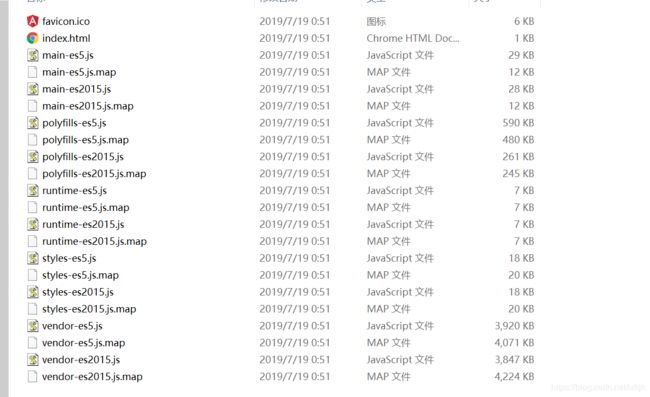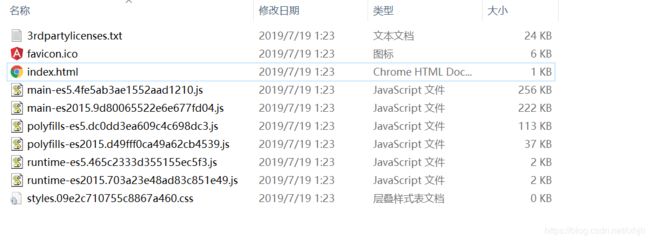Angular脚手架系列:四、使用Angular CLI进行Build (构建) 和 部署
目录
一、Build
二、ng build
三、Build Targets和Environment
四、Serve
五、部署到nginx
一、Build
Build主要会做以下动作:
- 编译项目文件并输出到某个目录
- Build targets决定了输出的结果
- bundling 打包
- 生产环境的build还会进行uglify和tree-shaking(把没用的代码去掉)
二、ng build
可以先看帮助:
ng build --helpCompiles an Angular app into an output directory named dist/ at the given output path. Must be executed from within a workspace directory.
usage: ng build [options]
arguments:
project
The name of the project to build. Can be an application or a library.
options:
--aot
Build using Ahead of Time compilation.
--base-href
Base url for the application being built.
--build-event-log
**EXPERIMENTAL** Output file path for Build Event Protocol events
--build-optimizer
Enables '@angular-devkit/build-optimizer' optimizations when using the 'aot' option.
--common-chunk
Use a separate bundle containing code used across multiple bundles.
--configuration (-c)
A named build target, as specified in the "configurations" section of angular.json.
Each named target is accompanied by a configuration of option defaults for that target.
Setting this explicitly overrides the "--prod" flag
--cross-origin
Define the crossorigin attribute setting of elements that provide CORS support.
--delete-output-path
Delete the output path before building.
--deploy-url
URL where files will be deployed.
--es5-browser-support
Enables conditionally loaded ES2015 polyfills.
--eval-source-map
Output in-file eval sourcemaps.
--extract-css
Extract css from global styles into css files instead of js ones.
--extract-licenses
Extract all licenses in a separate file.
--fork-type-checker
Run the TypeScript type checker in a forked process.
--help
Shows a help message for this command in the console.
--i18n-file
Localization file to use for i18n.
--i18n-format
Format of the localization file specified with --i18n-file.
--i18n-locale
Locale to use for i18n.
--i18n-missing-translation
How to handle missing translations for i18n.
--index
The name of the index HTML file.
--lazy-modules
List of additional NgModule files that will be lazy loaded. Lazy router modules will be discovered automatically.
--main
The full path for the main entry point to the app, relative to the current workspace.
--named-chunks
Use file name for lazy loaded chunks.
--ngsw-config-path
Path to ngsw-config.json.
--optimization
Enables optimization of the build output.
--output-hashing
Define the output filename cache-busting hashing mode.
--output-path
The full path for the new output directory, relative to the current workspace.
By default, writes output to a folder named dist/ in the current project.
--poll
Enable and define the file watching poll time period in milliseconds.
--polyfills
The full path for the polyfills file, relative to the current workspace.
--preserve-symlinks
Do not use the real path when resolving modules.
--prod
Shorthand for "--configuration=production".
When true, sets the build configuration to the production target.
By default, the production target is set up in the workspace configuration such that all builds make use of bundling, limited tree-shaking, and also limited dead code elimination.
--profile
Output profile events for Chrome profiler.
--progress
Log progress to the console while building.
--rebase-root-relative-css-urls
Change root relative URLs in stylesheets to include base HREF and deploy URL. Use only for compatibility and transition. The behavior of this option is non-standard and will be removed in the next major release.
--resources-output-path
The path where style resources will be placed, relative to outputPath.
--service-worker
Generates a service worker config for production builds.
--show-circular-dependencies
Show circular dependency warnings on builds.
--skip-app-shell
Flag to prevent building an app shell.
--source-map
Output sourcemaps.
--stats-json
Generates a 'stats.json' file which can be analyzed using tools such as 'webpack-bundle-analyzer'.
--subresource-integrity
Enables the use of subresource integrity validation.
--ts-config
The full path for the TypeScript configuration file, relative to the current workspace.
--vendor-chunk
Use a separate bundle containing only vendor libraries.
--vendor-source-map
Resolve vendor packages sourcemaps.
--verbose
Adds more details to output logging.
--watch
Run build when files change.
--web-worker-ts-config
TypeScript configuration for Web Worker modules. 针对开发环境, 就是用命令 ng build.
默认情况下, 它的输出目录在.angular-cli.json文件里ourDir属性配置的, 默认是/dist目录.
build之后会看见dist里面有这些文件:
- inline.bundle.js 这是webpack的运行时.
- main.bundle.js 就是程序代码.
- pollyfills.bundle.js 就是浏览器的Pollyfills.
- styles.bundle.js 样式
- vendor.bundle.js 是angular和第三方库
可以使用source-map-explorer来分析依赖, 并且查看哪些模块和类在bundle里面.
首先修改上一个例子中的代码:
admin.component.html
admin works!
app.component.html
Welcome to {{ title }}!
执行ng build:
可以看到生成了这些文件.
把dist里面的index.html格式化一下看看:
查看main-es5.js和main-es2015.js,可以看到我们写的代码。
在dist/my-app1下面运行程序: ng serve -o:
可以看到在ng serve的时候, 加载了上述的文件.
三、Build Targets和Environment
Environment是指采用哪一个环境文件:
而Targets则是用来决定项目文件是如何被优化的。看一下开发和生产build的对比
|
|
ng build |
ng build --prod |
| Environment |
environment.ts |
environment..prod.ts |
| 缓存 |
只缓存css里引用的图片 |
所有build的文件 |
| source maps |
生成 |
不生成 |
| 如何处理css |
全局css输出到js文件 |
生成的是css文件 |
| uglify |
不 |
是 |
| Tree-Shaking |
不去掉无用代码 |
去掉无用代码 |
| AOT |
不 |
是 |
| Bundling打包 |
是 |
是 |
| --build-optimizer |
否 |
是(和AOT以及Angular5) |
| --named-chunks |
是 |
否 |
| --output-hashing |
media |
所有 |
下面命令都是针对开发时的build, 它们的作用是一样的:
ng build
ng build --dev
ng build --dev -e=dev
ng build --target=development --environment=dev下面则是生产build:
ng build --prod
ng build --prod -e=prod
ng build --target=production --environment=prod其它常用的参数还有:
--sourcemap -sm 生成source map
--aot Ahead of Time编译
--watch -w Watch并rebuild
--environment -e Build环境
--target -t Build target
--dev 表示dev env和target
--prod 表示prod env和target
先使用--aot:
ng build --aot试试生产环境:
ng build --prod可以看到所有的文件都非常小了
四、Serve
ng serve. 已经一直在用了, 下面看看它常用的参数:
--open -o 打开默认浏览器
--port -p 端口
--live-reload -lr 发生变化时重新加载网页(默认开启的)
--ssl 使用https
--proxy-config -pc 代理配置
--prod 在内存中serve 生产模式build的文件
试试 --prod:
ng serve --prod通过文件大小可以看出确实是prod build的.
五、部署到nginx
1、linux安装nginx,查看《linux安装nginx步骤》
2、上传ng build --prod生成的dist下的文件夹(与工程同名)到linux服务器。
3、配置nginx的配置文件nginx.conf
说明:
A、端口可以是任意非占用的端口;
B、根文件夹,这里指向上传的angular工程所在的文件夹;
4、重启nginx
5、浏览器访问









